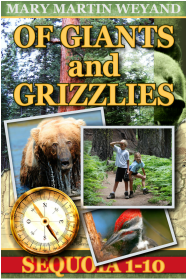Left alone, the natural world of flora and fauna maintains a pretty decent balance. Unfortunately us humans can decide to eliminate a whole species from our environment without considering the consequences of the loss to the ecosystem. For example, we eliminated every single California grizzly bear early in the last century. Today we threaten other species including the wolf and the coyote.
A caution to be more thoughtful comes from environmental writer and Nature-Travel author, Candice Gaukel Andrews. "We should be thoughtful when speaking about "the others" with whom we share this world; it's a future indicator for how they will be treated. Wolves are often described as "vicious" and "ravenous," and stories such as Peter and the Wolf and Little Red Riding Hood perpetuate that myth. Yet, children hear tales about cute and cuddly Winnie-the-Pooh, Paddington bear and Little bear every night.
"However, from 1900 to 1980 in North America, black bears caused 23 human fatalities, yet only two human deaths on the continent have been attributed to wolves in the past 100-plus years. Statistically, our dogs are far more dangerous than wolves: dogs kill about 30 Americans each year. And while we've never attempted to eradicate all bears in the country, we have once eradicated and still have campaigns to wipe out Canis lupus. Our choices of words have consequences for animals."
As a southern Californian, I have great respect for the coyote, Canis latrans. An adaptable member of the dog family, they've managed to survive in a densely human habitat. They eat rodents, rabbits, fish, frogs, insects, snakes, fruit and more. We don't seem to mind the eating of snakes, insects and the like. But of course, we take exception to their killing our pets and livestock. We do need to keep our perspective. We are the ones who have domesticated our dogs and cats to the point that they can't defend themselves. Coyote, on the other hand are doing what they are supposed to do.
We might ask, " what do us humans eat? (rabbits, fish, livestock, etc.)
Just "food" for thought . . .
A caution to be more thoughtful comes from environmental writer and Nature-Travel author, Candice Gaukel Andrews. "We should be thoughtful when speaking about "the others" with whom we share this world; it's a future indicator for how they will be treated. Wolves are often described as "vicious" and "ravenous," and stories such as Peter and the Wolf and Little Red Riding Hood perpetuate that myth. Yet, children hear tales about cute and cuddly Winnie-the-Pooh, Paddington bear and Little bear every night.
"However, from 1900 to 1980 in North America, black bears caused 23 human fatalities, yet only two human deaths on the continent have been attributed to wolves in the past 100-plus years. Statistically, our dogs are far more dangerous than wolves: dogs kill about 30 Americans each year. And while we've never attempted to eradicate all bears in the country, we have once eradicated and still have campaigns to wipe out Canis lupus. Our choices of words have consequences for animals."
As a southern Californian, I have great respect for the coyote, Canis latrans. An adaptable member of the dog family, they've managed to survive in a densely human habitat. They eat rodents, rabbits, fish, frogs, insects, snakes, fruit and more. We don't seem to mind the eating of snakes, insects and the like. But of course, we take exception to their killing our pets and livestock. We do need to keep our perspective. We are the ones who have domesticated our dogs and cats to the point that they can't defend themselves. Coyote, on the other hand are doing what they are supposed to do.
We might ask, " what do us humans eat? (rabbits, fish, livestock, etc.)
Just "food" for thought . . .

 RSS Feed
RSS Feed

